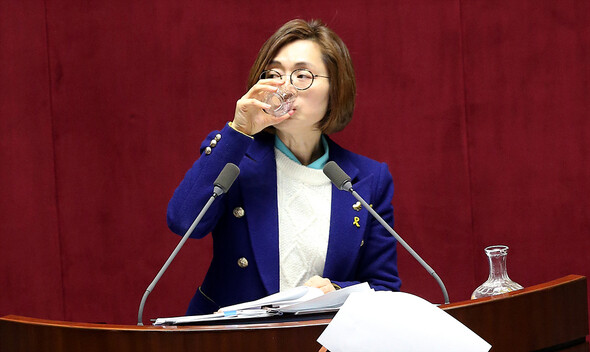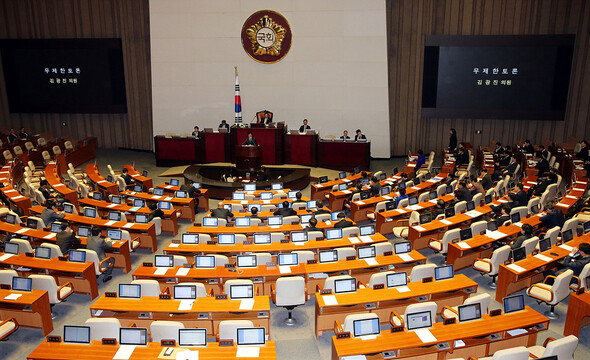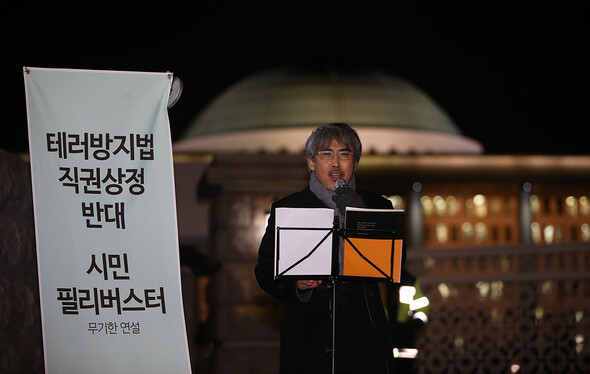hankyoreh
Links to other country sites 다른 나라 사이트 링크
Anti-terror bill runs into opposition filibuster

National Assembly speaker Chung Ui-hwa asserted his authority on Feb. 23 to bring a controversial anti-terror bill to the floor for a vote, describing the recent tensions on the Korean Peninsula provoked by a nuclear test by North Korea as a “national state of emergency corresponding to a war or incident.”
To prevent the legislation from being passed, the opposition parties have launched a filibuster on the floor of the National Assembly, in which it is pointing out problems with the anti-terror bill put forward by the ruling party. This is the first filibuster in South Korea since 1969.
Civic groups also strongly objected to Chung’s decision to bring the bill to the floor, expressing their concern that the NIS would abuse its authority and infringe on civil rights.
On Tuesday evening, Chung Ui-hwa called a session of the National Assembly and asserted his authority to bring the Anti-Terror Act for Protection of the People and Public Safety, a bill submitted by the Saenuri Party (NFP), to the floor. Chung defined the current situation as “a public safety emergency” and said that “the anti-terror bill cannot be put off any longer.”

On Tuesday morning, Chung had declared a deadline of 1:30 pm, by which time he said that lawmakers on the Intelligence Committee and Legislation and Judiciary Committee had to conclude their review of the bill.
The anti-terror bill that Chung brought to the floor would establish an anti-terror agency in the Prime Minister’s Office while also authorizing the NIS to snoop on suspected terrorists and to track their bank accounts. The bill would also empower civil rights regulators to monitor the NIS for manipulation of the law.
In deciding to exert his authority to bring the bill to the floor, Chung concluded that the current situation is a “national state of emergency corresponding to a war or incident,” which is what the National Assembly Act requires for the speaker to exercise this authority. In support of his decision, Chung cited a government report that North Korea is building its terrorist capacity against the South to prepare for attacks on important infrastructure and expert testimony that it is highly likely that North Korea will carry out various terrorist acts.
But Chung‘s decision is provoking controversy. Chung failed to follow the proper procedures for bringing the anti-terror bill to the floor, critics allege. Furthermore, they say, the bill would give the NIS - an agency that it is not feasible to monitor objectively - the authority to listen in on private communication and track bank accounts and would also spark allegations about election meddling and infringement of civil rights.
The opposition parties have opposed empowering the NIS to eavesdrop on private communications and to track bank accounts out of concern that the spy agency might abuse its power.
“In disregard of the law and the spirit of abiding by the National Assembly Act, Speaker Chung gave in to enticements and pressure from the Blue House and made an extralegal attempt to bring the bill to the floor. This is unacceptable,” said Lee Jong-geol, floor leader of the opposition Minjoo Party, speaking to a meeting of party lawmakers on Tuesday afternoon.
“This attempt to turn the already all-powerful National Intelligence Service into a monster by giving it indiscriminate authority to collect information, to carry out investigations and to listen in on private communication would be inexplicable if not for the agency’s regular meddling in politics and its meddling in the upcoming parliamentary and presidential elections,” Minjoo Party Floor Spokesperson Kim Gi-jun told the press during a briefing, promising that the party would do whatever it took to block the bill.
On Tuesday afternoon, 108 lawmakers with the Minjoo Party submitted a request for a filibuster to the National Assembly, and the party launched a debate that continued through the night to hold off a vote on the anti-terror bill.
The filibuster was kicked off by Rep. Kim Gwang-jin, a member of the National Assembly’s National Defense Committee. At 7:05 pm on Tuesday, Kim began speaking in a voice that was much more leisurely than usual. “Members of the Korean public, which I love and respect, Honorable Speaker, and colleagues in the National Assembly, today I applied for a filibuster in regard to the anti-terror act,” Kim said.
At that moment, a large number of representatives from the Saenuri Party began to file out of the assembly hall. With a calm voice, Kim launched into his criticism of Chung Ui-hwa.
After completing a speech in which he stood in the same place for 5 hours and 35 minutes, Kim stepped down from the podium at 12:40 am on Feb. 24. This was considerably longer than the previous filibuster record of 5 hours and 19 minutes, set in 1964 by Kim Dae-jung, who would later become president. Kim’s colleagues who were still in the hall gave him a standing ovation to show their encouragement.
After Kim was finished, the filibuster was continued by Rep. Moon Byeong-ho, a lawmaker with the People’s Party who had led discussion of the anti-terror act while he was still a member of the Minjoo Party of Korea, and Rep. Park Won-seok, a lawmaker with the Justice Party. The fractured political opposition appears to be closing ranks and working together to oppose the anti-terror bill.
Rep. Eun Su-mi of the Minjoo Party took over the filibuster at 2:30 am on Wednesday and continued into the afternoon. She had urged netizens to participate in real time by sharing opinions and materials.
In order to encourage the lawmakers who were taking part in the filibuster, the opposition party organized groups from each permanent committee to keep an eye on the floor of the National Assembly from midnight on Feb. 24, while Speaker Chung Ui-hwa and Deputy Speakers Jeong Gap-yun and Lee Seok-hyeon manned the speaker’s chair in 90-minute shifts. One lawmaker who applied for the filibuster even brought along an adult diaper in preparation for prolonged remarks.

Civic groups also took steps to oppose the anti-terror bill.
“As National Assembly Speaker, Chung Ui-hwa is supposed to speak for voters and to protect the rights and interests of the public. Instead, he is being swept along by the National Intelligence Service’s fabrication of information and manipulation of public attention to take peremptory action to block the very attempt to carry out a democratic and public discussion of concerns about the severe and obvious human rights violations in this bill,” said People’s Solidarity for Participatory Democracy (PSDP), calling for the bill to be dismissed. The group joined with members of the public to carry out a “citizens’ filibuster” in front of the National Assembly.
By Lee Kyung-mi and Song Kyung-hwa, staff reporters
Please direct questions or comments to [english@hani.co.kr]

Editorial・opinion
![[Column] Season 2 of special prosecutor probe may be coming to Korea soon [Column] Season 2 of special prosecutor probe may be coming to Korea soon](https://flexible.img.hani.co.kr/flexible/normal/500/300/imgdb/original/2024/0426/3317141030699447.jpg) [Column] Season 2 of special prosecutor probe may be coming to Korea soon
[Column] Season 2 of special prosecutor probe may be coming to Korea soon![[Column] Park Geun-hye déjà vu in Yoon Suk-yeol [Column] Park Geun-hye déjà vu in Yoon Suk-yeol](https://flexible.img.hani.co.kr/flexible/normal/500/300/imgdb/original/2024/0424/651713945113788.jpg) [Column] Park Geun-hye déjà vu in Yoon Suk-yeol
[Column] Park Geun-hye déjà vu in Yoon Suk-yeol- [Editorial] New weight of N. Korea’s nuclear threats makes dialogue all the more urgent
- [Guest essay] The real reason Korea’s new right wants to dub Rhee a founding father
- [Column] ‘Choson’: Is it time we start referring to N. Korea in its own terms?
- [Editorial] Japan’s rewriting of history with Korea has gone too far
- [Column] The president’s questionable capacity for dialogue
- [Column] Are chaebol firms just pizza pies for families to divvy up as they please?
- [Column] Has Korea, too, crossed the Rubicon on China?
- [Correspondent’s column] In Japan’s alliance with US, echoes of its past alliances with UK
Most viewed articles
- 1‘We must say no’: Seoul defense chief on Korean, USFK involvement in hypothetical Taiwan crisis
- 2Is Japan about to snatch control of Line messenger from Korea’s Naver?
- 3[Editorial] Korea’s surprise Q1 growth requires objective assessment, not blind fanfare
- 4Division commander ordered troops to enter raging flood waters before Marine died, survivor says
- 5No good, very bad game for Korea puts it out of Olympics for first time since 1988
- 6Korea’s 1.3% growth in Q1 signals ‘textbook’ return to growth, says government
- 7[Reportage] On US campuses, student risk arrest as they call for divestment from Israel
- 8N. Korean delegation’s trip to Iran shows how Pyongyang is leveraging ties with Moscow
- 9Flying “new right” flag, Korea’s Yoon Suk-yeol charges toward ideological rule
- 10[Column] Park Geun-hye déjà vu in Yoon Suk-yeol